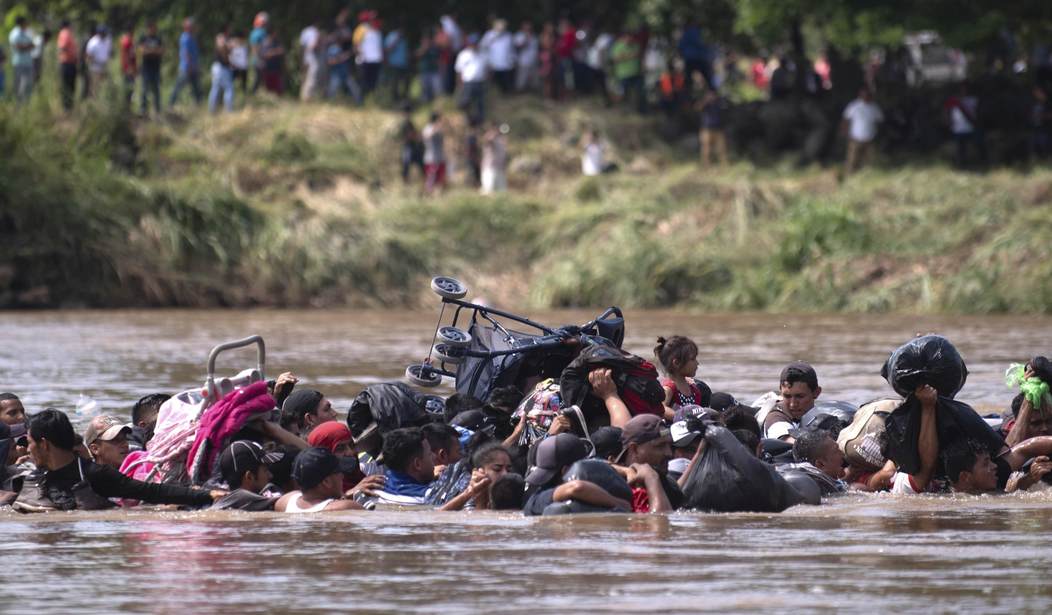The new president of El Salvador, Nayib Bukele, on Monday claimed responsibility for the deaths of a Salvadoran father and his daughter who drowned crossing the Rio Grande River attempting to reach the U.S.
The father, Óscar Alberto Martínez Ramírez, and his 23-month-old daughter, Valeria, became famous throughout the U.S. due to a photo, taken by journalist Julia Le Duc, that depicts them lying face down in shallow water along the bank of the Rio Grande, the father’s black shirt pulled up to his chest with the little girl tucked inside.
Democratic congressmen and Democratic presidential candidates consistently blamed Trump for these deaths and called for changes to Trump’s immigration policies because of this incident at the Rio Grande.
“To see that father and daughter embrace until the end, it just is absolutely devastating,” Rep. Adam Schiff (D-Calif.) told CNN last week. “I have to say that the president’s effort to deflect responsibility—this is the product of this policy.”
Senator Bernie Sanders called the photo “just one painful example of so many that demonstrate the reckless disregard for basic humanity that have come from Trump’s policies.”
Former Rep. Beto O’Rourke bluntly tweeted, “Trump is responsible for these deaths.”
Trump is responsible for these deaths. https://t.co/UZirFjh3fm
— Beto O'Rourke (@BetoORourke) June 26, 2019
At a news conference in San Salvador, the capital of El Salvador, President Bukele announced, “We can say President Trump’s policies are wrong; we can say Mexico’s policies are wrong. Oscar and his daughter died, but they were seeking asylum in Mexico for two months.”
“They [Óscar and Valeria] fled, they fled our country. It is our fault. We haven’t been able to provide anything. Not a decent job, not a decent school. What if this little girl would [have] had a decent school here, a decent health care system for her and her family, a decent house with water supply, a job for his [her] parents, for his [her] mother and his [her] dad, a decent job?,” he added.
Salvadoran President Bukele did note to the BBC that he still condemns the treatment of migrants in the U.S. and Mexico, but kept emphasizing that El Salvador had to “focus on making our country better, making our country a place where nobody has to migrate.”
Governments in Central America have historically done little to discourage emigration due to the large number of remittances obtained by emigrants: in 2018 alone, Salvadorans abroad sent nearly $5.5 billion, nearly 20% of El Salvador’s GDP, in remittances back to their home country.
Unlike past leaders, President Bukele, who was elected in February 2019, vowed to curb the emigration of Salvadorans. Recently, the number of Salvadorans coming to the U.S. has increased significantly.
The number of Salvadorans apprehended at the U.S. border has nearly doubled to more than 60,000 compared to inflows from the previous year.
President Bukele promises to tackle employment opportunities, poverty, and insecurity to allow Salvadorans to seek a better life at home.
At the end of March, President Trump cut off all direct, annual foreign assistance, roughly $615 million, to the Northern Triangle nations of El Salvador, Honduras, and Guatemala, claiming that, despite “taking our money,” Northern Triangle countries are “doing absolutely nothing” to prevent emigration.
The State Department initially softened the blow of President Trump’s cut by providing roughly $432 million in June from the 2017 budget to the Northern Triangle for anti-gang, education, and health initiatives that “were too far advanced to end them,” according to Fox News.
The State Department planned on withholding only $370 million from the fiscal year 2018 budget as well, potentially due to similar reasons.
Regardless of the exact amount of money being cut, it may initially appear that President Trump’s reduction in funding may have prompted President Bukele to actively attempt to stem the tide of emigrants from El Salvador by improving its political and social institutions.
However, President Bukele had been consistently making the case for improvements in El Salvador before President Trump’s threats.
In his first public speech since becoming president, which was at the conservative think tank, The Heritage Foundation on March 13, President Bukele underlined the importance of economic growth and development in El Salvador.
In his speech, he also stated that he wanted to improve U.S.-El Salvador relations and emphasized the importance of “providing opportunities back home” by “luring private investment.”
“We don’t want any handouts. Actually we are ready to refuse aid if it will jumpstart commerce. We do want to do business with the United States,” President Bukele added.
Although President Trump might not have prompted El Salvador to action like he did with Mexico in the past, it is still a good sign moving forward that El Salvador and the U.S. will continue to pursue the same goals. Perhaps President Trump should restore funding to El Salvador to demonstrate to Guatemala and Honduras that he is serious about the migration crisis and willing to provide rewards to those who actively help combat it.









Join the conversation as a VIP Member